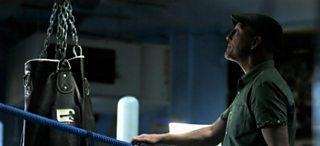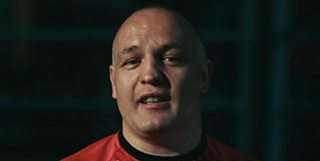What Next When Boxing Ends?
For boxers the biggest fight they face usually takes place the next time they step into the ring.

However the toughest fight of all may well come when they finally step out of the ring – for good.
Having often sacrificed everything for their career – time with their family, money, their health - there is a risk of being left with nothing at the end of it, but memories of what might have been.
Boxing journalist Gavan Casey said there was almost no comparison with any other walk of life.
“Imagine dedicating 30 years of your life towards something, you’ve got the world title on your mantlepiece and you wake up one morning – its gone, its over.
“Not only are you are you a former world champion, but you are a former boxer. What happens next?”.
Former world champion Brian Magee agrees: “That was one of the hardest parts of my career, adapting to normal life, finishing boxing and walking away from a career fighting.
“It goes from waking up in the morning with purpose to waking up with no purpose at all.
“When you were a boxer you were somebody, you were a champion, you were a boxer and then all of a sudden you are not.”
According to a new 大象传媒 NI documentary When Boxing Ends, the statistics speak for themselves.
Just three percent of boxers will earn enough to retire and never have to work again. Many fighters barely earn a living.
Of the £2,000 a boxer gets for a four-round bout the manager gets £500, the trainer £200 and the camp £200 – leaving the fighter £1,100.
Boxing manager Mark Dunlop said the road to success was a long one and many fall by the wayside.
“It is a long drawn-out process. Basically you need at least ten years with a good positive record to even get your name mentioned for a title shot.
“A lot of kids don’t earn much money until championship level. Divide it out by an hourly rate, you know you wouldn’t even be on minimum wage.”
The harsh reality of life on the way up was experienced by Ryan Burnett. He ended up living in his car when the money stopped coming in.

“You think ‘I’m doing all this work and getting no money for it.’ I was only 19 at the time and I had moved to England by myself.
“I was living in a house share and I had no family around me and no friends around me. I could not pay my rent so I had to leave my apartment that I was in.
"I lived in my car for six weeks. It was tough, but I said ‘its alright just keep cracking on, just keep waiting for the door to get opened’.”
Mark Dunlop says they are driven on by the possibility that the next fight might turn things around.
“They have given their jobs up, their careers up, just to focus on the sacrifice that is professional boxing, knowing that one fight can change their lives forever."
In Brian Magee’s case that was just what happened.
“I was just one month away from losing the house. It was ten grand I was looking for. That day when I got home a famous promoter from Denmark phoned me and said ‘do you want to fight for the European title?’.
“You could not have made it up. It was like, such a relief. If he’d offered me ten grand I’d have taken the fight, but he offered me more.”
He won the fight and it did turn things around.
“Now I think it was one of my best performances, because there was just so much on the line. I was fighting for my life, my livelihood.”
He eventually saved enough start a business when he retired from the ring.
“My last couple of fights was saving to get the gym open. I have had my time in the sun, my time in the limelight.
“At the start I thought I’ll be like Mike Tyson, I’ll have a tiger in the back garden and drive Ferraris and be surrounded by beautiful women and all that kind of stuff, but it does not work out like that.
“People see you, people see you fight on Sky TV, fighting this glamorous fight and everybody thinking I was a millionaire walking around.”
Ryan Burnett also opened a gym, funded by the proceeds of his career, but in very different circumstances from Brian Magee.

He was competing in the Super Series when disaster struck out of nowhere.
“I felt myself settling into the fight, everything was going good and just completely out of the blue I ripped my internal oblique.
“It felt like something inside my body ripped in half and I couldn’t move. My body wouldn’t work, it wouldn’t do what I was asking it to and the pain was excruciating.
“I went down. I was trying to move and I could not move and I was scared to punch, because I knew how sore it was going to be. I stayed on my feet thinking if I just stayed on my feet I might recover a bit.”
Eventually he decided enough was enough.
“It is a fighter’s mentality. A fighter will always keep wanting to fight. I lost my world title, something I had worked my whole life for, in a fashion that just wasn’t fair.
“That’s a bit disheartening, but I suppose anything can happen. We went to the doctor’s and we had a good chat with the doctor and the doctor just said to me ‘look if you keep fighting you are going to put yourself at more risk'.
“I decided to step away from boxing.”
If injury does not stop a boxer then the passing years eventually will.
Gavan Casey said the decline was inevitable.
“When you are 38 or 39-years-old your reflexes are not the same, your speed is not the same, you might not carry the same pop in your fists as you once did, but your brain still begs you to fight the same way you used to.
“How do you tear yourself away from that? If you were chasing something for, you know, the bones of your adult life and even going back as far as childhood and all of a sudden it is finished. It is a sort of crystallising realisation, a watershed in your life.
“And so it can be very difficult to come to peace with the fact what they have pursued for their entire lives, that pursuit has come to an end.”
Or as another former boxing champion Eamonn Magee puts it “once you are done, you are done.”
• When Boxing Ends is on 大象传媒 One NI on Monday, September 21st, at 2245 and then on 大象传媒 iPlayer